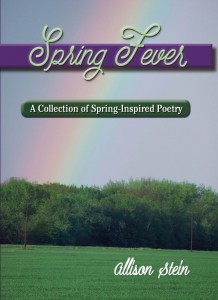By Allison Stein
When a thought captivates my mind, it dominates the very cadence of my heartbeat.
Take the summer of 2012. In those pivotal moments, I promised myself that I had the stamina to publish a book. Although I ultimately championed impregnable faith, reverberations of fear reminded me that my dream was a mere delusion: I had no idea what it took to be a writer. All I knew was that nobody could hear the suppressed emotions incessantly screaming inside me—the muffled words pounding through my chest—and writing made people listen. If I was a prisoner to self-doubt, words were my liberation. Poetry gave me a voice.
But what if destiny silenced my voice? The minute I sat down with my unpolished manuscript, I realized how awkward I felt holding a red pen and telling myself that my amateur work was worth revision. Still, I persisted. Flipping through The Chicago Manual of Style in pursuit of a grammatical epiphany felt so right. I could not help believing that my life had just begun.
As I scrutinized the draft, however, insecurities became entangled in the intricate tapestry of my heartstrings. Was my poetry resonant enough to reach an audience? Suddenly, my soul felt cold. How could someone like me even imagine possessing the magical touch of an author? All I had were a borrowed three-ring binder, enough trust to take the road less traveled, and my stubborn drive to make a difference.
***
Three years later, I treasure a binder of my own. With two poetry collections and an editing position for an online magazine, I have become familiar with the road less traveled. I cherish the blessings of friends and mentors who have changed my life, and I pray that I, too, have rekindled others’ dormant hope.
This journey has been challenging but enriching: I have learned to take chances I would never trade for the security of my comfort zone. Because these risks have led to unexplored—and enriching—avenues, I have relished unforgettable memories, iridescent dreams, and newfound discoveries of what it takes to be a writer:
- Writing takes courage. Before the release of my first book, publication petrified me. Consumed by the vulnerability inevitable in revealing secrets to strangers, I almost forgot that dreams are worth the fear; paralyzed by the prospect of turning wishes to reality, I was scared that I was going to get hurt. Luckily, my shortsighted mindset faded as I submerged myself in the immersive endeavor of sharing my work with the world. Even though I did get hurt sometimes, those experiences are gems: They have taught me how strong I am.
- Writing takes faith. Doubt pulsed through my veins. What if my all-encompassing goal was only a silhouette of my overactive imagination? What if this breathing, palpitating dream—this vision that loomed beyond the scope of tangibility—was as fickle as a mirage? Although the battle of convincing my community that I had the passion and perseverance to become a writer was daunting, the harder-won victory was the moment I convinced myself.
- Writing takes love. What if readers cannot connect with the poetry I know as well as my heartbeat? What if no one listens? The worries were relentless; worse, I struggled to offer myself any consolation, for I recognized the merit of my fears. After excavating the insights of two chapbooks, however, I wish I had the opportunity to empower my past self with truth. This is the promise I would make to her: “Words set souls free. Even if you never get to revel in the privilege of publication, the ecstasy of creating each draft—of watching each silhouette of your manuscript emerge in more lucid intensity—will be beautiful and breathtaking in itself. Be brave.”

